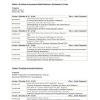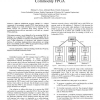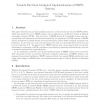135
click to vote
IJISEC
2010
15 years 28 days ago
2010
Physical Unclonable Functions (PUFs) are physical objects that are unique, practically unclonable and that behave like a random function when subjected to a challenge. Their use h...
132
Voted
CCS
2010
ACM
15 years 2 months ago
2010
ACM
We show in this paper how several proposed Physical Unclonable Functions (PUFs) can be broken by numerical modeling attacks. Given a set of challenge-response pairs (CRPs) of a PU...
151
click to vote
ICANN
2010
Springer
15 years 3 months ago
2010
Springer
So-called Physical Unclonable Functions are an emerging, new cryptographic and security primitive. They can potentially replace secret binary keys in vulnerable hardware systems an...
111
click to vote
CHES
2010
Springer
15 years 3 months ago
2010
Springer
We propose a new technique called stable-PUF-marking as an alternative to error correction to get reproducible (i.e. stable) outputs from physical unclonable functions (PUF). The ...
115
click to vote
TRUST
2010
Springer
15 years 7 months ago
2010
Springer
us Transfer based on Physical Unclonable Functions (Extended Abstract)" Session 2 (Tuesday 15:00 - 16:30) Place: „Salon Tiergarten“ 15:00-15:30 Patrick Koeberl (Intel; Ire...
145
click to vote
SIES
2009
IEEE
15 years 9 months ago
2009
IEEE
— Software intellectual property (SWIP) is a critical component of increasingly complex FPGA based system on chip (SOC) designs. As a result, developers want to ensure that their...
112
Voted
HOST
2009
IEEE
15 years 9 months ago
2009
IEEE
—EDA vendors have proposed a standard for the sharing of IP among vendors to be used in the design and development of IP for FPGAs. Although, we do not propose any attacks, we sh...
132
click to vote
WISTP
2010
Springer
15 years 9 months ago
2010
Springer
ct This paper discusses the practical implementation of a novel security tool termed SIMPL system, which was introduced in [1]. SIMPL systems can be regarded as a public key versio...



